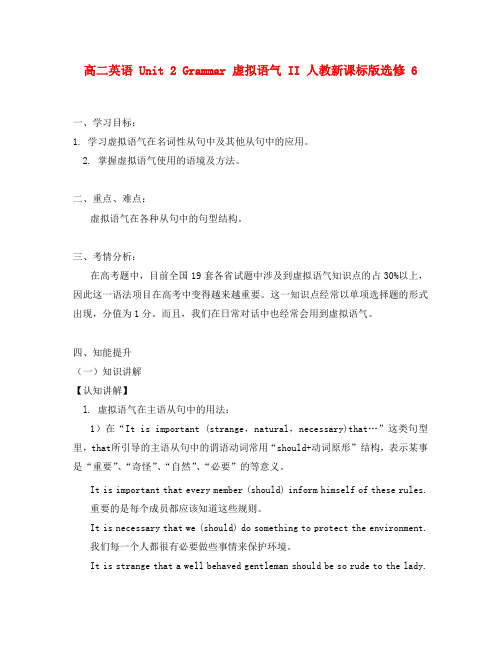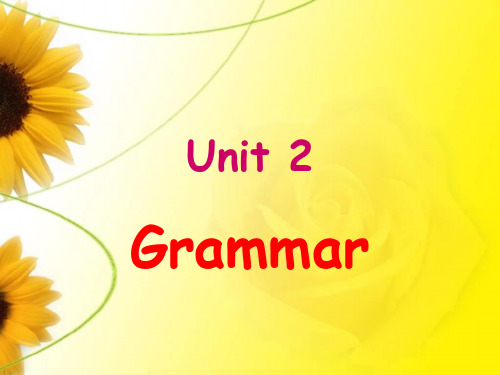经典:Unit2Grammar
- 格式:ppt
- 大小:538.50 KB
- 文档页数:15

9AU2Grammar 宾语从句一、宾语从句的定义在复合句中充当宾语作用的从句叫做宾语从句。
宾语从句可以用作谓语动词的宾语,也可以用作介词的宾语。
二、宾语从句的连接词1.由陈述句转化而来的宾语从句:把“that+陈述句”这一结构放在宾语的位置即构成宾语从句。
例句:The boy believes (that)he will travel through space to other planets.2.由一般疑问句转化而来的宾语从句:把“whether/if+陈述句”这一结构放在宾语的位置即构成宾语从句。
例句:I wonder whether/if they will come to our party.3.由特殊疑问句转化而来的宾语从句:把特殊疑问句变成陈述句语序后放在宾语的位置即构成宾语从句。
例句:None of us knows where these new parts can be bought.三、宾语从句的语序在宾语从句的复合句中,从句部分不管是陈述句还是疑问句都必须采用陈述语序。
I hear (that) physics isn’t easy.I think (that) you will like this school soon.Can you tell me how I can get to zoo?Please tell me when we’ll have the meeting.[注意]which, who, what在句子中是可以做主语的I wonder who is Tom’s English teacher.I don’t know what can be avoided.四、宾语从句的时态1. 如果主句的时态是一般现在时,宾语从句该用什么时态就用什么时态。
I don’t think (that) you are right.Please tell us where he is.Can you tell me how I can get to the railway station?2. 如果主句的时态是一般过去时,宾语从句只能用相应的过去时态(一般过去时,过去进行时,过去将来时,过去完成时)。

高二英语 Unit 2 Grammar 虚拟语气 II 人教新课标版选修 6一、学习目标:1. 学习虚拟语气在名词性从句中及其他从句中的应用。
2. 掌握虚拟语气使用的语境及方法。
二、重点、难点:虚拟语气在各种从句中的句型结构。
三、考情分析:在高考题中,目前全国19套各省试题中涉及到虚拟语气知识点的占30%以上,因此这一语法项目在高考中变得越来越重要。
这一知识点经常以单项选择题的形式出现,分值为1分。
而且,我们在日常对话中也经常会用到虚拟语气。
四、知能提升(一)知识讲解【认知讲解】l. 虚拟语气在主语从句中的用法:1)在“It is important (strange,natural,necessary)that…”这类句型里,that所引导的主语从句中的谓语动词常用“should+动词原形”结构,表示某事是“重要”、“奇怪”、“自然”、“必要”的等意义。
It is important that every member (should) inform himself of these rules.重要的是每个成员都应该知道这些规则。
It is necessary that we (should) do something to protect the environment.我们每一个人都很有必要做些事情来保护环境。
It is strange that a well behaved gentleman should be so rude to the lady.真奇怪,那个举止得体的绅士竟然对那位女士如此粗鲁。
2)It is ordered/suggested that…从句that引导的主语从句的谓语动词用“(should)+v.”结构。
这一类的动词还有:propose, require, demand, request, insist, ask等。
It is ordered that the cloth (should) be woven right now.命令传来,应该马上织布。




译林牛津英语9BUnit 2grammar基础知识梳理:1.work on the computer / work on a history projectwork out /work hard at /work as /work for2.interview an astronaut = have an interview with an astr onautn. interviewer3.leave for Shanghai4.practice playing the piano practise doing practice n. practical adj.5.search for information on the Internet6.read through all the passages without stopping7.The competition is well worth taking part in. be (well)worth do ing/n.8.make a great difference to our daily life9.change the way we live10.in ancient timese salt to help them keep fish or meat for a longer time12.go bad /go missing / go hungry / go wrong13.With the invention of the washing machine, people needn’t wash clothes by hand. / make journeys morecomfortable12. 他总是设法独自做每一件事。
He always manages to do everything by himself.13 宇航员们目前为下一次飞行做准备。
Unit 2 Let’s play sports!Grammar随堂小练习I.用所给动词的适当形式填空。
1. Simon’s cousin _______(look) tall and slim.2. Millie________ (have)an MP3 player.3. My cousin, Tony________(not do) his homework in the evening.4. What about ________(go) swimming this afternoon.5. Let Sandy _________(help) you with your English.【KEYS】I.1. looks2. has3. doesn’t do4. going5. help第一部分讲解分析一、新词的导学与解读1.weekend【用法】n.周末,【举例】What are your plans for the weekend?你周末计划做什么?【拓展】weekend的意思是“周末”,指星期六、星期日两整天,weekday可数名词,意为“工作日”,“在工作/上学日”翻译成“on weekdays”【实践】翻译句子。
我正在考虑在何处度周末。
_____________________________________.【点译】I was wondering where to spend the weekend.2. at weekends/ at the weekends/ on weekends on the weekends【用法】在周末;at weekends“每逢周末,在周末”,at/on weekends = at/on the weekend ,西方的人们把星期天看成是一个星期的第一天,所以weekend指的是Friday和Saturday。
但在国内,weekend指的多半还是Saturday和Sunday。
GRAMMAR一般将来时的被动语态【例句呈现】仔细阅读下列句子,注意观察它们的不同点。
1. We shall be asked to show the foreign friends around our school.2. Students will not be allowed to leave the school without their teacher’s permission.3. Will the plan be discussed at the meeting this afternoon?4. A new bridge is going to be built across the river to connect the two villages.5. Are these old trees going to be cut down?6. The form is to be filled in within two days.7. The young writer’s new book is not to be published this year.【归纳总结】1. 从以上例句中,我们可以看出一般将来时的被动语态的谓语主要有三种构成形式:①shall / will (shall只用于第一人称,will可用于所有人称) + be + 过去分词(见句1、句2和句3);②am / is / are going to + be + 过去分词(见句4和句5);③am / is / are + to + be + 过去分词(见句6和句7)。
2. 一般将来时的被动语态表示将要发生的被动动作,后常跟表示将来时间的时间状语。
3. 一般将来时的被动语态的否定形式是在shall / will, am / is / are后加not(见句2和句7);其疑问形式是将shall / will或am / is / are提前至句首(见句3和句5)。